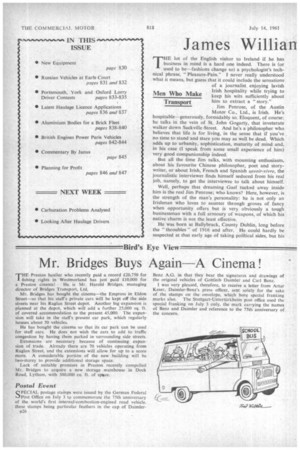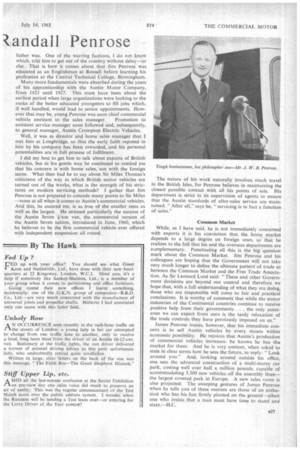James Willian
Page 34

Page 35

If you've noticed an error in this article please click here to report it so we can fix it.
Zandall Penrose
THE lot of the English visitor to Ireland if he has business in mind is a hard one indeed. There is (or used to be—fashions change so) a psychologist's technical phrase, "Pleasure-Pain." I never really understood what it means, but guess that it could include the sensations of a journalist enjoying lavish
Irish hospitality while trying to keep his wits sufficiently about him to extract a "story."
Jim Penrose, of the Austin Motor Co., Ltd., is Irish. He's hospitable—generously, formidably so. Eloquent, of course: he talks in the vein of St. John Gogarty, that inveterate walker down Sackville Street. And he's a philosopher who believes that life is for living, in the sense that if you've no time to stand and stare you may as well be dead. Which adds up to urbanity, sophistication, maturity of mind and, in his case (I speak from some small experience of him) very good companionship indeed.
But all the time Jim talks, with mounting enthusiasm, about his favourite Chinese philosopher, poet and storywriter, or about Irish, French and Spanish savoir-vivre, the journalistic interviewer finds himself seduced from his real job, namely, to get the interviewee to talk about himself.
Well, perhaps that dreaming Gael tucked away inside him is the real Jim Penrose; who knows? Here, however, is the strength of the man's personality: he is not only an Irishman who loves to saunter through groves of fancy when opportunity offers but is very obviously a tough businessman with a full armoury of weapons, of which his native charm is not the least effective.
He was born at Ballybrack, County Dublin, long before the " throubles " of 1916 and after. He could hardly be suspected at that early age of taking political sides, but his father was. One of the warring factions, I do not know which, told him to get out of the country without delay—or else. That is how it comes about that Jim Penrose was educated as an Englishman at Rossall before learning his profession at the Central Technical College, Birmingham.
Many more fundamentals were absorbed during the years of his apprenticeship with the Austin Motor Company, from 1925 until 1927. This must have been about the earliest period when large organizations were looking to the ranks of the better educated youngsters to fill jobs which, if well handled, would lead to senior appointments. However that may be, young Penrose was soon chief commercial vehicle assistant to the sales manager. Promotion to assistant service manager soon followed and, subsequently, to general manager, Austin Crompton Electric Vehicles.
Well, it was as director and home sales manager that I met him at Longbridge, so that the early faith reposed in him by his company has been rewarded, and his personal potentialities are in full process of fulfilment.
I did my best to get him to talk about exports of British vehicles, but in his gentle way he continued to remind me that his concern is with home sales, not with the foreign scene. What then had he to say about Sir Miles Thomas's criticisms of the way in which British motor vehicles are turned out of the works, what is the strength of his strictures on modern servicing methods? I gather that Jim Penrose is not prepared to concede many points to Sir Miles —none at all when it comes to Austin's commercial vehicles. And this, he assured me, is as true of the smaller ones as well as the largest. He stressed particularly the success of the Austin Seven 1-ton van, the commercial version of the Austin Seven saloon, introduced in June, 1960, which he believes to be the first commercial vehicle ever offered with 'independent suspension all round.
The nature of his work naturally involves much travel in the British Isles, for Penrose believes in maintaining the closest possible contact with all his points of sale. His department is strict in its supervision of agents to ensure that the Austin standards of after-sales service are maintained. "After all," says he, "servicing is in fact a function of sales."
Common Market While, as I have said, he is not immediately concerned with exports it is his conviction that the home market depends to a large degree on foreign ones, so that he realizes to the full that his and the overseas departments are complementary. Punctuating all this is the big question mark about the Common Market. Jim Penrose and his colleagues are hoping that the Government will not take very much longer to define the ultimate pattern of trade as between the Common Market and the Free Trade Association. As Sir Leonard Lord said: "These and other Government decisions are beyond our control and therefore we hope that, with a full understanding of what they are doing, those who are responsible will come to fair and practical conclusions. It is worthy of comment that while the motor industries of the Continental countries continue to receive positive help from their governments . . . the only assistance we can expect from ours is the tardy relaxation of the trade controls they have previously imposed on us."
James Penrose insists, however, that his immediate concern is to sell Austin vehicles by every means within economic possibility. He rejoices that Austin's production of commercial vehicles increases: he knows he has tha market for them. And he is very content, when asked to state in clear terms how he sees the future, to reply; " Look around you." And, looking around outside his office, one sees the advanced construction of a multi-storey car park, costing well over half a million pounds, capable of accommodating 3,300 new vehicles off the assembly lines— the largest covered park in Europe. A new sales room is also projected. The sweeping gestures of James Penrose when he tells you of these matters are those of an enthusiast who has his feet firmly planted on the ground—albeit one who insists that a man must have time to stand and stare.—H.C.
































































































































